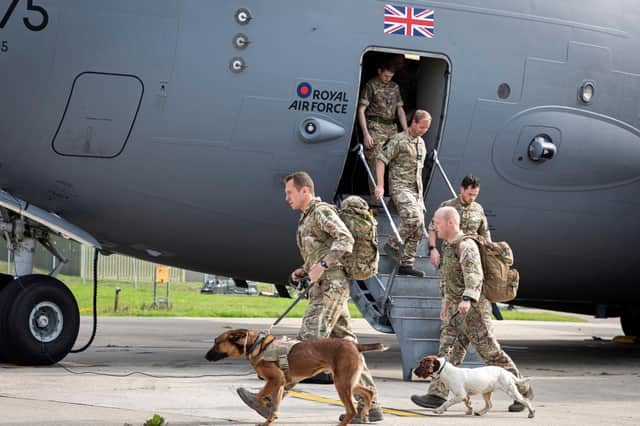The Afghanistan crisis is a failure of political leadership - Brian Monteith


The politician who ends up on the commemorative plaque may even be from a different party in government that commissioned the initiative. The tragedy now unfolding in Afghanistan and the ramifications it will have in the coming years is not unlike that phenomenon.
There is a rush to place blame with the current Prime Minister, Foreign Secretary, and Defence Secretary for those left behind but there have been many incumbents who will have made decisions leading directly to the failures taking place on the watch of Boris Johnson, Dominic Raab and Ben Wallace. Until there is a parliamentary inquiry into the Afghan withdrawal – and there undoubtedly shall be – care should be taken not to scapegoat current ministers when the full facts are not known.
Advertisement
Hide AdAdvertisement
Hide AdBritish troops were originally committed to the Afghan theatre by Tony Blair and Gordon Brown, a policy continued by David Cameron and Nick Clegg from 2010 until that coalition agreed to withdraw in 2012. Frontline British forces had left by 2014 with only technical, training and advisory support remaining until this year when abandoning their presence was made certain following decisions taken by US Presidents Trump and Biden to end the so-called “forever wars”. Yet since 2014 the UK has had “big beasts” such as Philip Hammond, Boris Johnson and Jeremy Hunt as Foreign Secretaries before Dominic Raab, while astonishingly there have been six British ambassadors in that seven year period.
It is more likely our political class and their weak foreign policy culture are at fault than just one Minister or official.
There are questions to be asked of our intelligence community and whether it failed to alert our government to the likely collapse of the Afghan government and especially the speed of that collapse. I doubt however our intelligence network failed so comprehensively, more likely is that advice was ignored by officials and politicians. It is already apparent – because the CIA’s former head of counter terrorism in Afghanistan, Douglas London, has written about it – revealing the Trump and Biden administrations were advised to expect a collapse of the Afghan army and that it could be swift. Biden chose to ignore it.
We should remember the five eyes intelligence community of the US, Canada, Australia, New Zealand and the UK share intelligence. If the CIA was doubtful about the Afghan government surviving full troop withdrawal then we should expect MI6 to be aware of that and evaluate it alongside their own sources and brief our Government accordingly.
I would expect any parliamentary inquiry to get to the bottom of that and the findings could be very damaging for ministers going back years, not just those currently in post.
But what also of Theresa May who was Prime Minister from 2016 to 2019, the longest period in office of any prime minister since British troops were withdrawn in 2014?
May’s record in post already provides a litany of failure based upon her obduracy and broken promises; a Conservative poseur’s poseur, she would say one thing and meanwhile be working against those very commitments just given. It was May who coined the utterly meaningless phrase “Brexit means Brexit”, which was as empty as saying “porridge means porridge” – and I say that as a porridge lover, knowing that some people like it with salt, some like it with jam and some don’t like it at all. That was of course her cynical point when it came to talking about Brexit.
Those believing she now has something to offer despite the trail of devastation she left behind – not least throwing away a twenty-point lead in the polls to lose her inherited majority in parliament – appear to forget it was she who talked up what “Global Britain” could mean when she used the phrase eight times in her Lancaster House speech of January 2017. Yet we know she was working against her own speech’s central tenets from the moment she left the podium.
Advertisement
Hide AdAdvertisement
Hide AdFrom the 2018 “Lost in Translation” report of the Commons’ Select Committee on Defence it can be seen the warnings were already being given in plain sight of the maladministration at the heart of the failure to relocate Afghan interpreters and other Locally Employed Civilians loyal to Britain. A similarly dismissive attitude to our veterans suggests to me a culture change is needed. For Theresa May to stand in the Commons and ridicule the current government for drinking from the poisoned chalice she passed on – and use the concept of “Global Britain” as her punchline was a shameless moment for the discredited former premier.
There were three years of power when she could have ensured the current humanitarian tragedy be avoided but the evidence shows she and Hunt, not just Johnson, presided over incompetence and worse, disinterest.
That report is not hindsight – it offered warnings that could have been addressed. Even if everyone liable to be at risk of death was not brought to Britain from 2018 our governments could at least have identified the different categories of those most at risk and process their information so they would be ready to get people out if called to. For those of highest risk still working for us even a few months ago there would then have been a route to safety if the prospect of the Taliban taking over emerged at relatively short notice.
We can take pride in our troops handling the airlift, but our political class must face up to the derelict decisions and poor leadership that created the tragedy.
Brian Monteith is a director of the foreign policy think tank Global Britain and served in the Scottish and European Parliaments for the Conservative and Brexit Parties respectively.
Comments
Want to join the conversation? Please or to comment on this article.